北师大版(2019)选择性必修 第一册Unit 3 Conservation Lesson 1 The Sixth Extinction课件(共25张PPT)
文档属性
| 名称 | 北师大版(2019)选择性必修 第一册Unit 3 Conservation Lesson 1 The Sixth Extinction课件(共25张PPT) |

|
|
| 格式 | pptx | ||
| 文件大小 | 659.1KB | ||
| 资源类型 | 教案 | ||
| 版本资源 | 北师大版(2019) | ||
| 科目 | 英语 | ||
| 更新时间 | 2024-04-25 21:33:18 | ||
图片预览

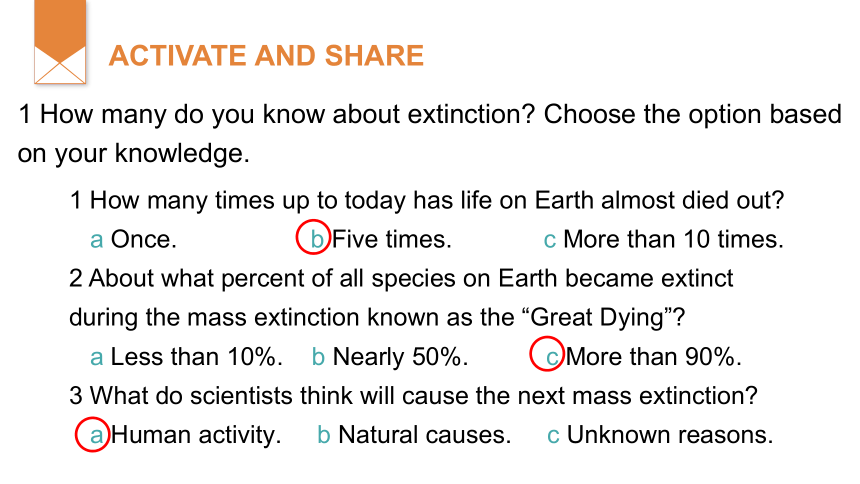
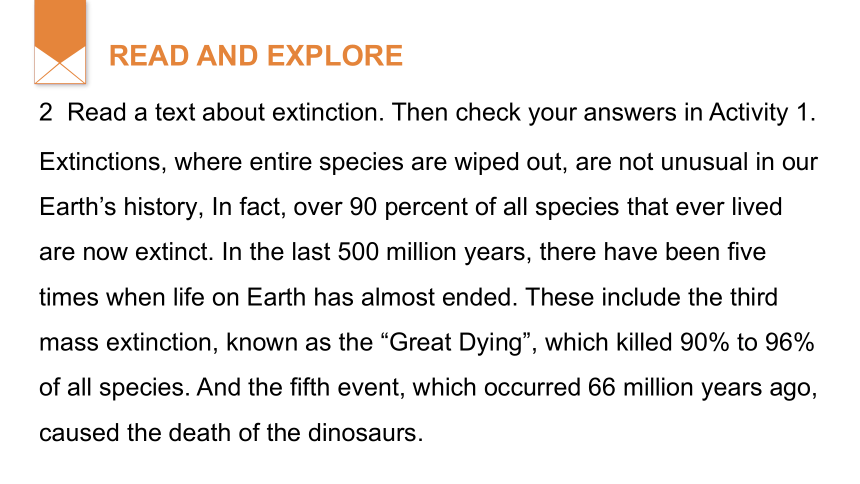

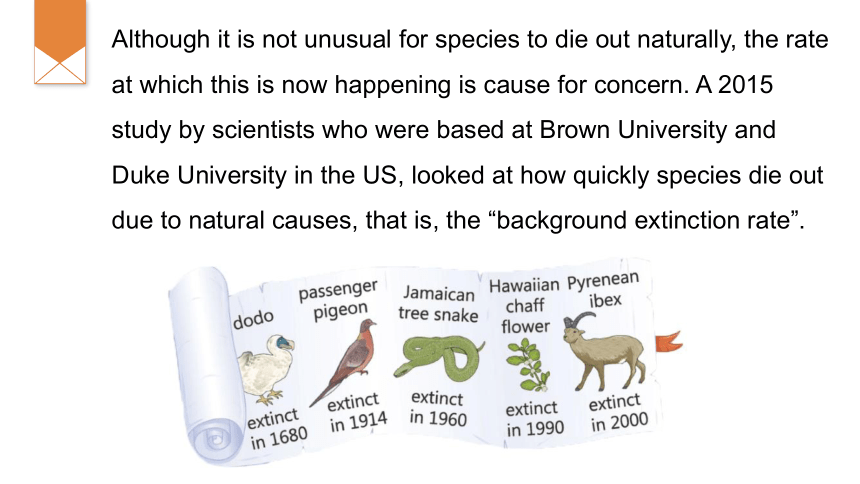
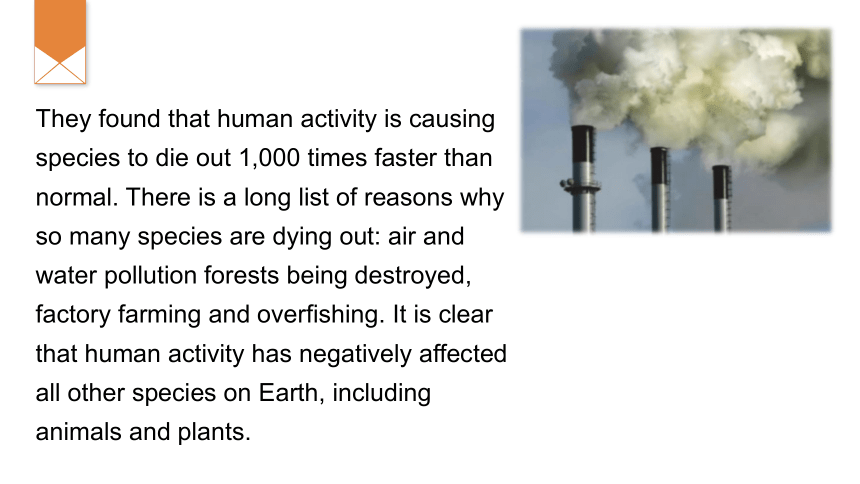
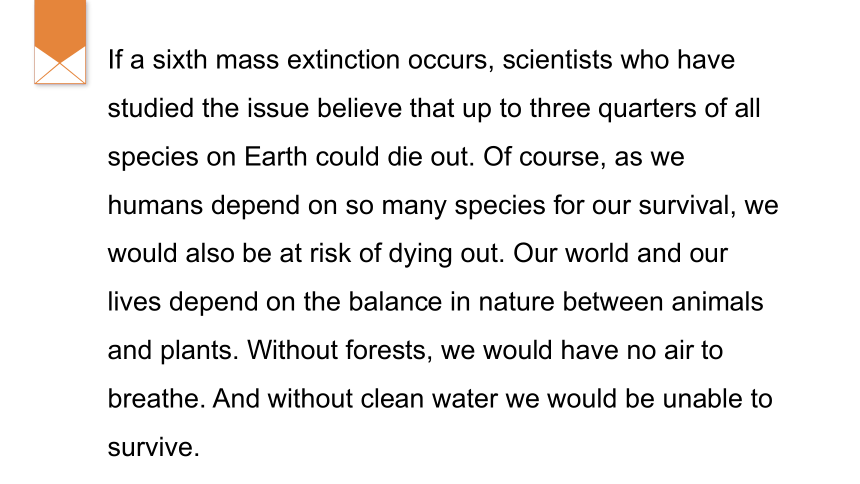
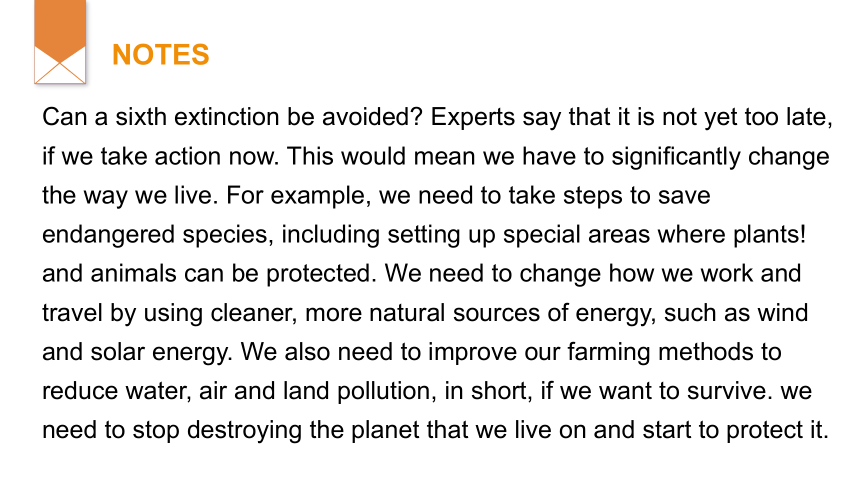
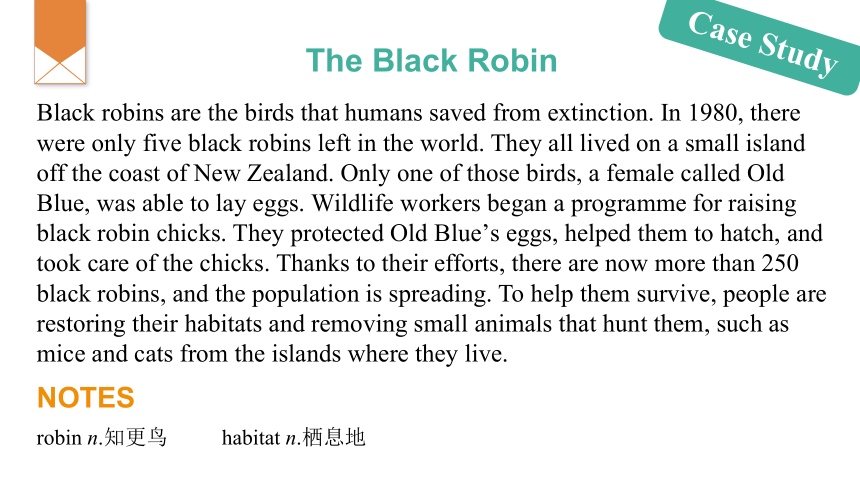
文档简介
(共25张PPT)
Unit 3 CONSERVATION
LESSON 1
THE SIXTH EXTINCTION
1 How many do you know about extinction Choose the option based on your knowledge.
ACTIVATE AND SHARE
1 How many times up to today has life on Earth almost died out
a Once. b Five times. c More than 10 times.
2 About what percent of all species on Earth became extinct during the mass extinction known as the “Great Dying”
a Less than 10%. b Nearly 50%. c More than 90%.
3 What do scientists think will cause the next mass extinction
a Human activity. b Natural causes. c Unknown reasons.
READ AND EXPLORE
2 Read a text about extinction. Then check your answers in Activity 1.
Extinctions, where entire species are wiped out, are not unusual in our Earth’s history, In fact, over 90 percent of all species that ever lived are now extinct. In the last 500 million years, there have been five times when life on Earth has almost ended. These include the third mass extinction, known as the “Great Dying”, which killed 90% to 96% of all species. And the fifth event, which occurred 66 million years ago, caused the death of the dinosaurs.
The reasons for extinctions are varied, According to scientists, they include volcanic eruptions, asteroids hitting the Earth from space, changes in sea levels, the decrease of the oxygen content of the sea and global warming. Many scientists say we are now entering the Earth’s sixth mass extinction. This time, human activity will be to blame.
Although it is not unusual for species to die out naturally, the rate at which this is now happening is cause for concern. A 2015 study by scientists who were based at Brown University and Duke University in the US, looked at how quickly species die out due to natural causes, that is, the “background extinction rate”.
They found that human activity is causing species to die out 1,000 times faster than normal. There is a long list of reasons why so many species are dying out: air and water pollution forests being destroyed, factory farming and overfishing. It is clear that human activity has negatively affected all other species on Earth, including animals and plants.
If a sixth mass extinction occurs, scientists who have studied the issue believe that up to three quarters of all species on Earth could die out. Of course, as we humans depend on so many species for our survival, we would also be at risk of dying out. Our world and our lives depend on the balance in nature between animals and plants. Without forests, we would have no air to breathe. And without clean water we would be unable to survive.
NOTES
Can a sixth extinction be avoided Experts say that it is not yet too late, if we take action now. This would mean we have to significantly change the way we live. For example, we need to take steps to save endangered species, including setting up special areas where plants! and animals can be protected. We need to change how we work and travel by using cleaner, more natural sources of energy, such as wind and solar energy. We also need to improve our farming methods to reduce water, air and land pollution, in short, if we want to survive. we need to stop destroying the planet that we live on and start to protect it.
The Black Robin
Case Study
Black robins are the birds that humans saved from extinction. In 1980, there were only five black robins left in the world. They all lived on a small island off the coast of New Zealand. Only one of those birds, a female called Old Blue, was able to lay eggs. Wildlife workers began a programme for raising black robin chicks. They protected Old Blue’s eggs, helped them to hatch, and took care of the chicks. Thanks to their efforts, there are now more than 250 black robins, and the population is spreading. To help them survive, people are restoring their habitats and removing small animals that hunt them, such as mice and cats from the islands where they live.
NOTES
robin n.知更鸟 habitat n.栖息地
3 Read the plete the notes. Then talk about the different aspects of extinctions.
entire species are wiped out The number of extinctions that have occurred so far: five
the third mass extinction killed 90% to 96% of all species; the fifth event, which occurred 66 million years ago, caused the death of the dinosaurs
volcanic eruptions, asteroids hitting the Earth from space, changes in sea levels, the decrease of the oxygen content of the sea, global warming
change the way we live; change how we work and travel by using cleaner, more natural sources of energy; improve our farming methods
4 Read again. Answer the questions.
What did scientists find out in 2015
2 Why does the writer think the sixth mass extinction will come
They found out that human activity is causing species to die out 1,000 times faster than normal.
Because human activity has negatively affected all other species on Earth, including animals and plants.
Why does the writer believe we’ll probably die out if 75% of the Earth’s species die out.
4 What did people do in the case study to protect black robins
Which claim(s) did the case study support in the text
Because we humans depend on so many species for our survival and our world and our lives depend on the balance in nature between animals and plants.
People protected Old Blue’s eggs, helped them to hatch, and took care of the chicks. People are restoring their habitats and removing small animals that hunt them like mice and cats from the islands where they live, The case study showed that even in desperate situations, we can do something to help, In short, it’s never too late.
5 Group Work Think and share.
1 Use different coloured pens to highlight at least one example for each of the four elements listed below. Then find out: (1) What typical language is used (2) What text type is this piece of writing (3) What is its communicative purpose
facts
opinions / predictions
reasons
solutions
facts: over 90 percent of all species that ever lived are now extinct; the “Great Dying”, which killed 90% to 96% of all species; human activity is causing species to die out 1,000 times faster than normal
reasons: air and water pollution, forests being destroyed, factory farming and overfishing; Without forests, we would have no air to breathe, and without clean water we would be unable to survive.
opinions/predictions: many scientists say we are now entering the Farth’s sixth mass extinction; scientists believe that up to three quarters of all species on Earth could die out
solutions: we need to take steps to save endangered species, including setting up special areas where plants and animals can be protected; We need to change how we work and travel...; We also need to improve our farming methods...
(2)This piece of writing is an exposition.
(3)Its communicative purpose is to explain what the sixth extinction is and its effects and call on people to take action to prevent it from happening.
2 What ways of argument does the writer use to convince readers
Are you convinced Why or why not
The writer uses ways such as citing ideas from experts or authorities, giving examples and using data.
6 Use the adjectives and nouns to make meaningful expressions.Then use each expression to make a sentence.
_____________________________________________________________________________________________________________________________________________________________________________________________________________________________________________________________________________________________
entire species;
endangered animals;
significant change;
natural resources;
mass extinction;
solar energy
7 Complete the paragraph about extinctions using the correct form of the phrases below.
In the last 500 million years, there have been five mass extinction events on Earth. In the third event, which 1__________ the “Great Dying”, 90% to 96% of all species 2 ________. Of course, species died out due to many causes. But nowadays, human activity 3___________ all types of species that we 4________ for living. We need to 5 ________ to avoid the sixth mass extinction. We should 6 ________ to save endangered animals and plants, and 7 ________ special areas to 8 __________ them before the next extinction comes that may 9 ________ the entire species.
is known as
died out
has affected
depend on
take action
take steps
set up
take care of
wipe out
FOCUS ON LANGUAGE: RELATIVE CLAUSES (4)- DEFINING AND NON-DEFINING CLAUSES
8 Read the sentences and discuss which word(s) the clauses (in italics) refer to.
1 Extinctions, where entire species are wiped out, are not unusual in our Earth’s history.
2 These include the third mass extinction, known as the “Great Dying”, which killed 90% to 96% of all species.
3 A 2015 study by scientists who were based at Brown University and Duke University in the US, looked at how quickly species die out due to natural causes …
4 If a sixth mass extinction occurs, scientists who have studied the issue believe that un to three quarters of all species on Earth could die out.
5 We need to take steps to save endangered species, including setting up special areas where plants and animals can be protected.
Which of the clauses above:
(1)give information to identify the persons / obiects.(_________)
(2)give extra information about a person or a thing, which can be left out. (_________)
3;4;5
1;2
9 Underline the relative clauses in the sentences and decide if they are defining (D) or non-defining (ND). Translate them into Chinese. Discuss the difference in meaning between the two types of relative clauses.
( )1 He went to a city where iron was produced in huge quantities.
( )2 The bus which was full of tourists stopped near the Leaning Tower of Pisa.
( )3 Melissa lent me some money, which was very generous of her.
( )4 The ground is covered with snow and ice, which makes driving very
dangerous.
( )5 l met the famous professor in the hotel, where the meeting was held.
D
D
ND
ND
ND
EXPRESS YOURSELF
10 Group Work Choose two or three environmental problems that are caused by human activity. Offer solutions. Try to use relative clauses where appropriate.
完成课后相关练习
谢谢观看
Unit 3 CONSERVATION
LESSON 1
THE SIXTH EXTINCTION
1 How many do you know about extinction Choose the option based on your knowledge.
ACTIVATE AND SHARE
1 How many times up to today has life on Earth almost died out
a Once. b Five times. c More than 10 times.
2 About what percent of all species on Earth became extinct during the mass extinction known as the “Great Dying”
a Less than 10%. b Nearly 50%. c More than 90%.
3 What do scientists think will cause the next mass extinction
a Human activity. b Natural causes. c Unknown reasons.
READ AND EXPLORE
2 Read a text about extinction. Then check your answers in Activity 1.
Extinctions, where entire species are wiped out, are not unusual in our Earth’s history, In fact, over 90 percent of all species that ever lived are now extinct. In the last 500 million years, there have been five times when life on Earth has almost ended. These include the third mass extinction, known as the “Great Dying”, which killed 90% to 96% of all species. And the fifth event, which occurred 66 million years ago, caused the death of the dinosaurs.
The reasons for extinctions are varied, According to scientists, they include volcanic eruptions, asteroids hitting the Earth from space, changes in sea levels, the decrease of the oxygen content of the sea and global warming. Many scientists say we are now entering the Earth’s sixth mass extinction. This time, human activity will be to blame.
Although it is not unusual for species to die out naturally, the rate at which this is now happening is cause for concern. A 2015 study by scientists who were based at Brown University and Duke University in the US, looked at how quickly species die out due to natural causes, that is, the “background extinction rate”.
They found that human activity is causing species to die out 1,000 times faster than normal. There is a long list of reasons why so many species are dying out: air and water pollution forests being destroyed, factory farming and overfishing. It is clear that human activity has negatively affected all other species on Earth, including animals and plants.
If a sixth mass extinction occurs, scientists who have studied the issue believe that up to three quarters of all species on Earth could die out. Of course, as we humans depend on so many species for our survival, we would also be at risk of dying out. Our world and our lives depend on the balance in nature between animals and plants. Without forests, we would have no air to breathe. And without clean water we would be unable to survive.
NOTES
Can a sixth extinction be avoided Experts say that it is not yet too late, if we take action now. This would mean we have to significantly change the way we live. For example, we need to take steps to save endangered species, including setting up special areas where plants! and animals can be protected. We need to change how we work and travel by using cleaner, more natural sources of energy, such as wind and solar energy. We also need to improve our farming methods to reduce water, air and land pollution, in short, if we want to survive. we need to stop destroying the planet that we live on and start to protect it.
The Black Robin
Case Study
Black robins are the birds that humans saved from extinction. In 1980, there were only five black robins left in the world. They all lived on a small island off the coast of New Zealand. Only one of those birds, a female called Old Blue, was able to lay eggs. Wildlife workers began a programme for raising black robin chicks. They protected Old Blue’s eggs, helped them to hatch, and took care of the chicks. Thanks to their efforts, there are now more than 250 black robins, and the population is spreading. To help them survive, people are restoring their habitats and removing small animals that hunt them, such as mice and cats from the islands where they live.
NOTES
robin n.知更鸟 habitat n.栖息地
3 Read the plete the notes. Then talk about the different aspects of extinctions.
entire species are wiped out The number of extinctions that have occurred so far: five
the third mass extinction killed 90% to 96% of all species; the fifth event, which occurred 66 million years ago, caused the death of the dinosaurs
volcanic eruptions, asteroids hitting the Earth from space, changes in sea levels, the decrease of the oxygen content of the sea, global warming
change the way we live; change how we work and travel by using cleaner, more natural sources of energy; improve our farming methods
4 Read again. Answer the questions.
What did scientists find out in 2015
2 Why does the writer think the sixth mass extinction will come
They found out that human activity is causing species to die out 1,000 times faster than normal.
Because human activity has negatively affected all other species on Earth, including animals and plants.
Why does the writer believe we’ll probably die out if 75% of the Earth’s species die out.
4 What did people do in the case study to protect black robins
Which claim(s) did the case study support in the text
Because we humans depend on so many species for our survival and our world and our lives depend on the balance in nature between animals and plants.
People protected Old Blue’s eggs, helped them to hatch, and took care of the chicks. People are restoring their habitats and removing small animals that hunt them like mice and cats from the islands where they live, The case study showed that even in desperate situations, we can do something to help, In short, it’s never too late.
5 Group Work Think and share.
1 Use different coloured pens to highlight at least one example for each of the four elements listed below. Then find out: (1) What typical language is used (2) What text type is this piece of writing (3) What is its communicative purpose
facts
opinions / predictions
reasons
solutions
facts: over 90 percent of all species that ever lived are now extinct; the “Great Dying”, which killed 90% to 96% of all species; human activity is causing species to die out 1,000 times faster than normal
reasons: air and water pollution, forests being destroyed, factory farming and overfishing; Without forests, we would have no air to breathe, and without clean water we would be unable to survive.
opinions/predictions: many scientists say we are now entering the Farth’s sixth mass extinction; scientists believe that up to three quarters of all species on Earth could die out
solutions: we need to take steps to save endangered species, including setting up special areas where plants and animals can be protected; We need to change how we work and travel...; We also need to improve our farming methods...
(2)This piece of writing is an exposition.
(3)Its communicative purpose is to explain what the sixth extinction is and its effects and call on people to take action to prevent it from happening.
2 What ways of argument does the writer use to convince readers
Are you convinced Why or why not
The writer uses ways such as citing ideas from experts or authorities, giving examples and using data.
6 Use the adjectives and nouns to make meaningful expressions.Then use each expression to make a sentence.
_____________________________________________________________________________________________________________________________________________________________________________________________________________________________________________________________________________________________
entire species;
endangered animals;
significant change;
natural resources;
mass extinction;
solar energy
7 Complete the paragraph about extinctions using the correct form of the phrases below.
In the last 500 million years, there have been five mass extinction events on Earth. In the third event, which 1__________ the “Great Dying”, 90% to 96% of all species 2 ________. Of course, species died out due to many causes. But nowadays, human activity 3___________ all types of species that we 4________ for living. We need to 5 ________ to avoid the sixth mass extinction. We should 6 ________ to save endangered animals and plants, and 7 ________ special areas to 8 __________ them before the next extinction comes that may 9 ________ the entire species.
is known as
died out
has affected
depend on
take action
take steps
set up
take care of
wipe out
FOCUS ON LANGUAGE: RELATIVE CLAUSES (4)- DEFINING AND NON-DEFINING CLAUSES
8 Read the sentences and discuss which word(s) the clauses (in italics) refer to.
1 Extinctions, where entire species are wiped out, are not unusual in our Earth’s history.
2 These include the third mass extinction, known as the “Great Dying”, which killed 90% to 96% of all species.
3 A 2015 study by scientists who were based at Brown University and Duke University in the US, looked at how quickly species die out due to natural causes …
4 If a sixth mass extinction occurs, scientists who have studied the issue believe that un to three quarters of all species on Earth could die out.
5 We need to take steps to save endangered species, including setting up special areas where plants and animals can be protected.
Which of the clauses above:
(1)give information to identify the persons / obiects.(_________)
(2)give extra information about a person or a thing, which can be left out. (_________)
3;4;5
1;2
9 Underline the relative clauses in the sentences and decide if they are defining (D) or non-defining (ND). Translate them into Chinese. Discuss the difference in meaning between the two types of relative clauses.
( )1 He went to a city where iron was produced in huge quantities.
( )2 The bus which was full of tourists stopped near the Leaning Tower of Pisa.
( )3 Melissa lent me some money, which was very generous of her.
( )4 The ground is covered with snow and ice, which makes driving very
dangerous.
( )5 l met the famous professor in the hotel, where the meeting was held.
D
D
ND
ND
ND
EXPRESS YOURSELF
10 Group Work Choose two or three environmental problems that are caused by human activity. Offer solutions. Try to use relative clauses where appropriate.
完成课后相关练习
谢谢观看
同课章节目录
- Unit 1 Relationshis
- Lesson 1 Teachers
- Lesson 2 How Do We Like Teachers’ Feedback?
- Lesson 3 So Close,Yet So Fa
- Unit 2 Success
- Lesson 1 Money vs Success
- Lesson 2 Top Five Secrets of Success
- Lesson 3 Getting to the Top
- Unit 3 Conservation
- Lesson 1 The Sixth Extinction
- Lesson 2 War on Plastic Packets
- Lesson 3 The Road to Destruction
